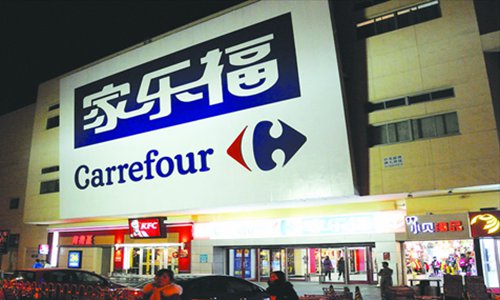Foreign retailers losing ground in Chinese market
By Song Lin and Wang Cong Source:Global Times Published: 2019/6/24 23:13:40
Overseas giants need to adjust to ever-changing local market: expert

A Carrefour store in downtown Beijing. Photo: IC
French supermarket giant Carrefour has become the latest foreign retailer to either retreat from China or sell their Chinese operations to local companies, as they continue to lose ground in the fast-changing and increasingly competitive Chinese market.
The sales woes experienced by foreign retailers also point to a larger picture of foreign giants losing their dominance in the Chinese market as local competitors rise, which highlighted the need for foreign companies to rethink their strategy in China, as the country continues to open up its massive market, analysts said.
Carrefour Nederland BV has agreed to sell an 80 percent stake in its China unit, Carrefour China Holdings, to Suning International Group Co, a unit of Chinese retailer giant Suning.com, for 4.8 billion yuan ($698 million), according to a Suning filing to the Shenzhen Stock Exchange dated Saturday.
The transaction is expected to be completed by the end of the year as Carrefour China, which operates 210 hypermarkets and 24 convenience stores, has seen a sharp decline in sales. In 2018, sales were down almost 10 percent year-on-year to 3.6 billion euros ($4.1 billion).
Carrefour China's majority stake sales also followed some of the world-renowned supermarkets that have reportedly pulled out from China, such as Tesco from the UK and Lotte Mart from the South Korea. Other retailers have sought local partnerships, like Walmart, which teamed up with Chinese internet giant Tencent in 2018.
The troubles of foreign retailers in China stem from their failure to adjust their business strategies to the fast-changing trends in the Chinese market, where consumers increasingly turn to online shopping platforms, rather than brick-and-mortar stores, for their daily needs.
"Online stores deliver to your door step. Who would want to go to the store in the summer heat?" Jiang Yuanrui, a Beijing resident, told the Global Times on Monday. "It's more cost-effective to shop online."
Online retail sales in China grew 25.4 percent year-on-year to over 7 trillion yuan in 2018, accounting for 45.2 percent of China's total sales of consumer goods for the year, according to data from the Chinese Ministry of Commerce in February.
Adaptation needed
Though China has continued to open up its massive domestic market to foreign companies, they also must adjust their strategy and step up their localization efforts to stay competitive, analysts said.
"The main problem is that their localization falls short and they have not been able to effectively adjust operational strategy to meet the constantly changing consumer needs," Liang Zhenpeng, a Beijing-based senior industry expert, told the Global Times on Monday.
He further noted that rising local competition has also squeezed foreign firms out of the Chinese market, because the foreign giants tend to be focused on long established business models that have low efficiency and high costs.
"In the ever-changing consumer market, they need to improve their efficiency to be able to compete with local companies," Liang told the Global Times, adding that, overall, they need to better integrate with the pace of China's development.
Chinese competitors
Foreign retailers are not the only ones who have been suffering a decline in sales in China. Other global giants in the fields of smartphones and new-energy vehicles (NEVs) have also been suffering, where Chinese companies, which have gained much experience and become very efficient over the years through the fast growing Chinese economy, have outperformed their foreign counterparts.
Suning.com, Tencent and e-commerce giant Alibaba have dominated the country's online retail market and the three have also been moving to brick-and-mortar stores. In mobile devices, Chinese vendors such as Huawei, Xiaomi and Vivo have significantly cut into the market share of foreign brands such as Apple and Samsung. In NEV, Chinese firms such as BYD and Geely have dominated the fast-rising segment.
"As China becomes more and more open to foreign companies, they are also required to adapt to the Chinese market, the needs of the consumers and competition," Lu Zhenwang, founder of Shanghai Wanqing Commerce Consulting, told the Global Times on Monday, noting there is still a huge potential for foreign companies in areas such as high-tech.
Retailers still have room to grow, as online shopping won't be able to cover all of the demand, but they need to be more efficient and make the necessary adjustments, Lu said.
RELATED ARTICLES: